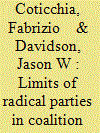|
|
|
Sort Order |
|
|
|
Items / Page
|
|
|
|
|
|
|
| Srl | Item |
| 1 |
ID:
090605


|
|
|
|
|
| Publication |
2009.
|
| Summary/Abstract |
American primacy continues to characterise the international system, despite trends toward a diffusion of power. The discussion is too often biased in favour of multipolarity due to imprecise or misleading definitions of US primacy. On the basis of a simple definition of what a "pole" is, combining GDP and defence expenditure, only the US can be considered a global pole. The current economic crisis is not changing this reality. Even considering perceptions, soft power, and the ability to translate power into influence, rising powers like China or an aggregate power like the EU have a long way to go before they can get on an equal footing with the United States.
|
|
|
|
|
|
|
|
|
|
|
|
|
|
|
|
| 2 |
ID:
120453


|
|
|
|
|
| Publication |
2013.
|
| Summary/Abstract |
This article seeks to explain the decisions by Nicolas Sarkozy's France and David Cameron's Britain to intervene in the 2011 Libyan crisis. None of the three major theories of international relations-constructivism, defensive realism and liberalism-can explain on its own such intervention decisions as the Libya case. The article's novel analytical model proposes that each theory emphasizes factors and mechanisms that explain part of the decision-making process and that these factors interact with state behaviour in complex ways. Britain and France initially began to consider intervention because they felt that the emergent norm of the 'responsibility to protect' applied to the Libyan case and because they believed the massive flows of refugees fleeing the violence were a threat to their border security. Both countries believed military intervention could be successful at relatively low cost and that if they did not intervene the problem would not be solved. At that point, the Sarkozy and Cameron governments engaged in initial action that made them more likely to intervene by jeopardizing their future economic relations with the Gaddafi regime and making him more likely to threaten them with future terrorist attacks. Taking initial action also meant that French and British prestige would ultimately have suffered had they not intervened to achieve a satisfactory solution to the crisis. Paris and London viewed international and regional support as a critical prerequisite for intervention and they sought and attained it. Finally, the Sarkozy and Cameron governments were able to minimize any domestic political risk of intervening because they had public and/or opposition party support.
|
|
|
|
|
|
|
|
|
|
|
|
|
|
|
|
| 3 |
ID:
072879


|
|
|
|
|
| Publication |
2005.
|
| Summary/Abstract |
Some have argued that the transatlantic rancor over the Iraq war made cooperation, especially on nonproliferation, unlikely. In contrast, this article, documents post-invasion instances of nonproliferation cooperation, with particular emphasis on the Proliferation Security Initiative and the EU-3 Initiative-the British, French, and German negotiations with Iran over its suspected nuclear activities. In addition to documenting French and British participation in these initiatives, the article analyzes why they have chosen to participate and argues that France and Britain have participated in both efforts because they are committed to avoiding future Iraq-like preventive wars.
|
|
|
|
|
|
|
|
|
|
|
|
|
|
|
|
| 4 |
ID:
159577


|
|
|
|
|
| Summary/Abstract |
Scholars increasingly suggest that coalition governments produce more extreme foreign policies than single-party governments. Extremity is especially likely when governments include radical parties that take extreme positions on foreign policy issues and are “critical” to the government’s survival, as the radical parties push the centrist ones toward the extremes. A look at Italy’s Second Republic provides an important counterpoint to the extremity hypothesis. In three high-profile cases of military operations—Albania 1997, Kosovo 1999, and Afghanistan 2006–08—Italy had a center-left government that depended on radical parties for its survival. In all cases, the radical parties opposed military operations but did not prevent the government from acting by forcing the government’s fall. Our article seeks to explain the limits of leftist radical parties in Italy’s Second Republic. We argue first that radical parties are reluctant to threaten or force government collapse as this can lead to an opposition coalition coming to office and voters’ being blamed for the outcome. Second, we claim that foreign policy has been less important to radical parties than domestic issues. Finally, we argue that radical parties have appealed to their voters through theatrical politics and have affected the implementation of military operations.
|
|
|
|
|
|
|
|
|
|
|
|
|
|
|
|
| 5 |
ID:
074579


|
|
|
|
|
| Publication |
2006.
|
| Summary/Abstract |
Many expected the April 2006 election of Romano Prodi's centre-left government to lead to a worsening of Italy-US relations. Yet it seems likely that Italy-US relations will remain strong because Italy's left has a record of moderate policymaking and the government should be able to manage challenges from the far left. Moreover, the Bush administration seems to have turned away from some of its more radical policies, which means that there will be more overlap in Italian and American policy preferences. The testbed may well be such contemporary challenges as Italy-US relations in Iraq, Afghanistan, and Iran.
|
|
|
|
|
|
|
|
|
|
|
|
|
|
|
|
| 6 |
ID:
084935


|
|
|
|
|
| Publication |
2008.
|
| Summary/Abstract |
Why do American presidents, when engaged in military coercion, sometimes bluff or exaggerate their resolve and other times do not? Bluffing increases the likelihood and lowers the cost of success, so a failure to bluff provides an intriguing puzzle. It is argued here that American presidents are more likely to bluff resolve when they face an opposition with a dovish public image, and when that opposition perceives a low likelihood that the adversary will call its bluff. The analysis of presidential signalling of resolve in Kosovo and Iraq supports claims by Kenneth Schultz that the opposition party has a tendency to expose presidential bluffing. I also show, however, that the opposition is significantly more likely to expose presidential bluffing when its party has a hawkish image - the public perception of the party's competence on national security and its willingness to use force - and when the opposition perceives a high probability that the bluff will be called. When the president knows the opposition is likely to expose a bluff, it makes sense for him to refrain from overstating resolve. Presidential bluffing is likely to occur when the opposition party has a dovish public image and when the opposition perceives a low probability that the bluff will be called. These findings have direct implications for American leaders and American threats to use force after the end of the George W. Bush presidency.
|
|
|
|
|
|
|
|
|
|
|
|
|
|
|
|
|
|
|
|
|